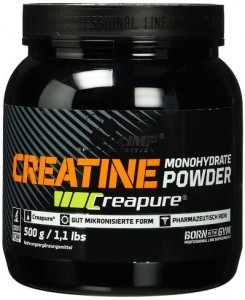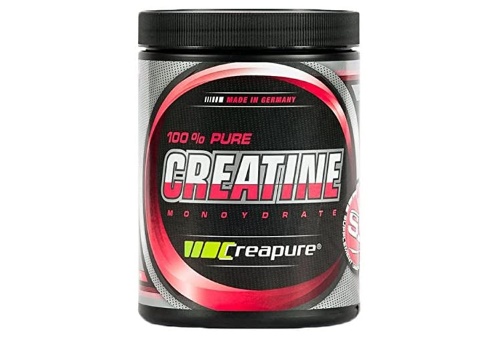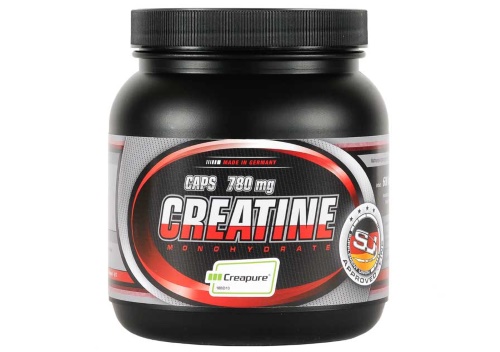Creatine monohydrate
Creatine Monohydrate is one of the most widely used performance-enhancing dietary supplements. It is especially popular with strength athletes and bodybuilders. In fact, I hardly know anyone who has done strength training for a long time, who hasn’t taken it at least once.
The proliferation of creatine in fitness and strength sports is primarily due to the fact that it is one of the few truly beneficial supplements that, when used correctly, have clear, proven benefits for the athlete without side effects. Both strengths are increased, and muscle building is clearly supported by proper intake. Of course, this is absolutely in the interests of the users.
However, there are still widespread rumors, misconceptions and biases about creatine monohydrate. For this reason, I decided to write this comprehensive article that aims to tell you about the extremely popular application. I raised the most frequently asked questions about this topic and tried to answer them in the most understandable and easiest way to implement.
I’ve divided the article into the following sections along with general questions for clarity. If you are particularly interested in something, you can use the provided link to go directly to the relevant section:
After reading this article, you should know enough so that no one can trick you in this area in the future. Then you know everything it takes to use creatine on your own to support your learning or be able to consciously decide against it.
At the very end of the article, I also linked some research that supports my claims.
What is creatine monohydrate and how it works
Creatine monohydrate is a non-protein-forming, non-essential amino acid that plays an important role in the process of energy supply to the muscles of all vertebrates.
Conversion from ATP to ADP (ATP is the fastest store of energy in muscles), and vice versa, always occurs with the participation of creatine or creatine phosphate. First of all, the energy available to the muscle in the short term can be increased by having enough creatine stores filled.

Your body is capable of producing creatine itself. This occurs in the liver or kidneys, where it is synthesized from various amino acids, that is, it is converted. Of course, this only works if you are consuming enough protein and you are not deficient in protein. Most of the creatine in the body is stored and used in skeletal muscle. Accordingly, it can only be added naturally through meat and fish.
If we are talking about creatine and creatine monohydrate, we can say that they are the same. Creatine monohydrate is simply the (more correct) chemical name for pure creatine.
Why take creatine monohydrate? What effect can you expect?
Simply put, taking creatine monohydrate correctly for the reasons outlined above has the potential to improve muscle energy supply.
Creatine is not an essential amino acid, so you can make it yourself, but not in infinite amounts. Your body can produce about 1–2 grams of creatine per day. This is also only possible if he has enough protein; Therefore, you should always eat enough protein foods. In principle, this amount is also sufficient for all basic body functions. With 1 to 2 grams per day, your muscle creatine stores are not overwhelmed at all. With that amount, you won’t be optimally prepared for better athletic performance.
I’m trying to describe this briefly and simply: to move muscles quickly requires energy from the previously mentioned ATP. In muscles, there is always a dynamic balance between ATP and creatine. If a lot of creatine accumulates in the muscles, the amount of ATP also increases. This means more energy is available in a short time.
With the addition of creatine monohydrate, muscle creatine storage can be increased or replenished on purpose, and thus performance levels during short-term intense training loads (for example, during IK training or hypertrophy / muscle building training) can be increased. This means that learning can be more intense and, accordingly, faster progress can be made.
In addition, your muscles consume more water due to the greater supply of creatine. This results in a leaner look, which is definitely desirable for muscle training. At least it also has psychological implications.
In endurance training, the direct positive effects of creatine on performance are limited. There are studies that show that regular intake of creatine monohydrate reduces cell damage in various endurance sports, which can also have a positive effect on training results, but I am not aware of any direct benefits. The situation is different with performance over short distances.

Rapid growth and performance enhancement with creatine monohydrate
How to take creatine correctly? (Amount / duration / frequency)
As one of the most frequently researched nutritional supplements, the benefits of creatine supplementation have been proven in several hundred studies. In fact, a meta-analysis is linked at the end of this article, which combined the results of 100 studies. I have also had a very positive experience with creatine monohydrate. However, for best results, it is very important that you take the correct creatine. Fortunately, the correct intake in terms of quantity, duration and frequency has already been tested many times, and it is possible to make informed recommendations.
How often should you take creatine?
A reasonable frequency of creatine intake can be easily determined. Once the supply is stopped, your creatine is depleted very quickly every other day. If you decide to take creatine monohydrate, then you must take it every day. If you interrupt the appointment over and over again, the effect of the appointment will be significantly less or not.
Don’t get me wrong, you won’t get shot if you forget to take your creatine dose every few weeks. However, if this happens more often or for several days in a row, you will have to accept a significant loss in productivity. Depending on the structure of your muscle building workout plan, planned development can be difficult due to fluctuations.
This is also because creatine needs a certain warm-up phase a few days before it can develop to its full effectiveness. For this reason, many athletes start with a higher dose to shorten this phase. However, after several days of inactivity, the storage systems were already shutting down too far to resume the warm-up phase.
How much creatine monohydrate should you take?
If you want to take creatine for a longer period of time, which I can only recommend, I recommend a dose of about 5 grams per day. Most of the significant research findings are based on 3-5 grams of creatine monohydrate per day. From practical experience, a dose of about 5 grams has worked very well.
At the beginning of the intake, a so-called loading phase can be carried out in order to quickly reach the optimal effective phase. At this stage, a significantly higher dose is taken – up to 0.3 grams per kilogram of body weight per day – to quickly get the creatine stores to maximum levels. However, this charging phase is not necessary. Especially with long-term use, the possible short-term benefit is put into perspective and possible complaints from high doses can be avoided.
Always adhere to the prescribed dosages. An approach based on the motto “More helps more” will not help you, it will only lead to problems due to the high dosage.
How long should you take creatine monohydrate?
Let me answer this question with a counter question: How long do you want to keep your muscles and their performance?
I think the answer is clear: basically forever. This is exactly the right time to add creatine monohydrate. Consuming creatine is one of the easiest in the world. You just take 5 grams a day until the day you die.
Some time ago it was different. Until a few years ago, it was so common to do so-called creatine medications. With this cyclical intake, the charging phase (about 25 g per week) is followed by a maintenance phase (about 3-5 g for 3-4 weeks), and then a break of several weeks. However, this approach is outdated and there are numerous studies that speak of long-term consumption.
There are also many practical reasons for long term income. For example, Complaints usually do not arise when taking 5 g continuously. Also for creating habits Regularity is helpful. When I take a break, I sometimes forget that I should start over. But if I take my creatine, I take it.
Possible weight fluctuations of up to 2 kg due to water retention are not necessary for everyone. This is due to high doses during the loading phase.
When is the best time to take creatine?
Since creatine builds up in your muscles and doesn’t break down there right away, you don’t need to take it as precisely when you take it. If you are sure you are taking it every day, then you are safe. If you take it in the morning and afternoon in the evening, it shouldn’t have (large) consequences.
For the sake of completeness, I want to mention that there is a relatively small study that showed that taking it immediately after training can bring minimal benefits. If it suits you well in your daily life, you can do it as follows. However, since I don’t have a daily workout on my schedule, I prefer to make daily supplements part of my morning ritual.
When taking creatine Monohydrate has no reason to keep looking at your watch.
However, as mentioned, you should definitely take it every day if you want to get the most out of it.
Additional tips for taking creatine monohydrate
There are a few other things you can and should consider if you want to get the best possible results from taking creatine. Therefore, I would like to give you the following tips for proper consumption:
- Take creatine monohydrate with plenty of water and make sure you drink enough, otherwise it may be absorbed completely and without symptoms.
- Drink creatine dissolved in water as quickly as possible because it moves in water over time. This is especially true at higher temperatures.
- It makes sense to take creatine monohydrate in combination with a sugar source (such as juice) because it can reach the muscles even faster due to the increased insulin levels.
Would you prefer to take creatine monohydrate or Kre-Alkalyn?
In most cases, creatine is taken in the form of creatine monohydrate. Most of the research on creatine has been done in this form. So this is by far the best research.
Meanwhile, there are other, more advanced types of creatine. The so-called Kre-Alkalyn is especially popular. It is a buffered creatine monohydrate that should be able to reach muscles faster and without damage due to increased pH. In theory, this makes sense. However, studies to date have not shown any clear benefit of Cre-Alcaline over classic creatine monohydrate.
In addition, Kre-Alkalyn is significantly more expensive, which, in my opinion, does not justify perhaps a minimal advantage.
By the way, the situation is similar to other popular creatine creations. Creatine hydrochloride, creatine ethyl ester (CEE), creatine malate, or even creatine fluid are just a few of them. Over the years, the supplement industry has been very creative in terms of product creation. However, none of these creations showed significantly better effects than the classic monohydrate. Some options are even worse in comparison. However, they are significantly more expensive.
However, there are probably a small number of so-called nonresponders (assumption: 1%) who do not respond to classic creatine monohydrate. “Normal” creatine has almost no effect on these people. In some cases, better results can be achieved with alternative connections, depending on the victim.
Which is better? Creatine capsules or creatine powder?
If you decide to buy a Creation product because of the many positive effects of creatine supplementation, you will find that the supplement is available in powder, capsule, and sometimes even pill form. Which is the correct option for someone to share a little. It is a fact, however, that with creatine monohydrate, it makes no difference to your body at the same dosage, whether you take it in powder or pill form.
However, some of the special forms of creatine are only available in pill form. This may be because the powder will be inedible. However, pure creatine powder is tasteless and can easily be added to other supplements.
Below, I have summarized the most important benefits of creatine monohydrate pill powder.
Benefits of Powdered Creatine Monohydrate:
My trend is clearly towards creatine monohydrate in powder form. The price is much lower than the tablet product. The powder can be mixed wonderfully with other supplements and, for example, drunk with a protein shake. Even pre-workout with a workout booster and / or with several BCAA’s, it can be combined perfectly together. Personally, I take it in the morning with my Sport Greens *.
If you would like to opt for powdered creatine monohydrate, I can only advise you to buy the micronized version, which has the best solubility. I only use German Creapure products. Very cheap creatine with this seal of approval is, for example, Creapure at the bodybuilding depot *. There you get another five percent discount on all products with my Fitvolution5 code.
If you prefer to order from Amazon, I recommend Olimp’s Creapure Monohydrate, which I used:

Benefits of Tablet Creatine Monohydrate:
In certain situations, a pill shape may of course also be preferred. Some find it easier to add a few pills than to shake (or stir) a cocktail. Especially on the go, it’s more convenient to carry a couple of pills than a can or bag of white powder. Of course, this also applies to getting the correct dosage on the go. From my own experience, I can say that when traveling, it makes no sense to have a large bag of white powder and small scales with you, as well as a small 5-gram bag that is already weighed.
I also rely on quality from Trostberg for the pill shape. When taking the tablets, it is important to always rinse them with enough water or juice to ensure that the meal works as best as possible. Manufacturers with the appropriate quality seal are limited here. The premium manufacturer Weider also offers such a product with its pure creatine capsules *.
What side effects can you expect from taking creatine?
First of all, it should be said that creatine monohydrate is a very well tolerated and safe food supplement. This has been proven in numerous studies.
However, there are always warnings about ingestion and its side effects. Especially the kidneys and liver must be damaged when taking creatine. However, I can assure you: so far no side effects have been found in healthy people if the basic rules of intake are followed.
These guidelines include drinking enough water consistently and not taking too much creatine monohydrate over a long period of time. If you don’t stick to it, it can lead to nasty complaints. This is primarily an upset stomach, in particular in the form of flatulence and stomach cramps.
If you develop symptoms despite correct consumption, I strongly recommend that you see your doctor. If you have liver and / or kidney problems, you must get your doctor’s consent before taking it.
Which product is better than creatine?
As with other supplements, the same is true for creatine monohydrate as it makes sense to attach importance to the highest quality standards.
First of all, you want to have the purest possible creatine monohydrate without impurities and contaminants. However, getting the product as clean as possible is time consuming and costs the manufacturer a lot of money. He usually has to pass it on to the client in price and / or cut it off from his own margin. Unfortunately, such contamination and toxin residues can usually only be detected by laboratory analysis. Therefore, suppliers of very cheap manufacturers from Asia should be treated with caution.
The effect is not always guaranteed by cheap manufacturers due to improper storage for too long a period. If stored improperly for a long time, the active ingredient will disintegrate and become unusable. Users then wonder why creatine monohydrate doesn’t affect them.
For these reasons, I can only advise everyone to buy creatine from Germany. There is a major manufacturer in Trostburg that gives products made from their raw materials the right to label those products with the Creapure label. Here you know you have creatine that has been manufactured to the strictest quality standards. For me, more security and better quality are always worth a manageable additional cost.
Ideally, the creatine monohydrate you want to buy is also listed in Cologne and is therefore approved for competition.
My recommendation for a creatine powder product
As mentioned earlier, I recommend Creapure Monohydrate Powder from Supplement Union or Olimp for powder. Both contain German first-class Creapure raw materials. I regularly consume products from both manufacturers for several years and have always been satisfied with the quality.
At Supplement Union, I have always been particularly impressed that all products are (almost) really made in Germany and that the manufacturer is very transparent with their products. Products are regularly tested by independent laboratories and reports are published. You also order there directly from the manufacturer, which has an excellent price / quality ratio. Therefore, I am glad that we have entered into a cooperation (all about my cooperation with Bodybuilding-Depot). With my code Fitvolution5, you get an additional 5% discount on already very cheap products.

Alternatively, you can of course also get Olimp Creapure Powder from Amazon * if you prefer to order it there.
My recommendation for a creatine capsule product
For a while, Supplement Union also offered Creapure capsules at its own online store, Bodybuilding-Depot. If you prefer this form of income or would like to have it as an alternative, you can also find a great product here, where my Fitvolution5 code is a little cheaper.

Your conclusion on creatine monohydrate
In addition to protein powder, creatine monohydrate is one of the most studied nutritional supplements in the field of fitness. Its clearly positive effects, especially on strength training, have been proven over and over again. Used correctly, creatine gives you more strength for the toughest workouts.
Contrary to many rumors, creatine is also a very safe and well-tolerated dietary supplement that, when taken correctly, can lead to significant performance gains. This means that you can better handle all the difficult basic exercises and achieve even greater success with your strength and muscle building. Therefore, it is rightfully one of the most widely used nutritional supplements among strength and fitness athletes. For these reasons, creatine is also one of the few beneficial supplements that I regularly recommend to my readers if they are doing strength training.
Even if creatine is now available in the most unusual options, proven creatine monohydrate is the smartest option. Whether you choose a product in powder or capsule form is up to you. The effect is the same. One may be more practical for you than the other.
While timing is not so important, it is all the more important to consistently and regularly consume creatine monohydrate at the correct dose in order to benefit from the beneficial effects. Take this regularly and it will help you reach your fitness goals even faster.
If your goal is to build muscle, I have something for you to help you even more effectively. My Basics Muscle Building program includes structured everything you need to grow your muscles reliably and as quickly as possible.
Sports greetings

And don’t forget: your health is your health.
